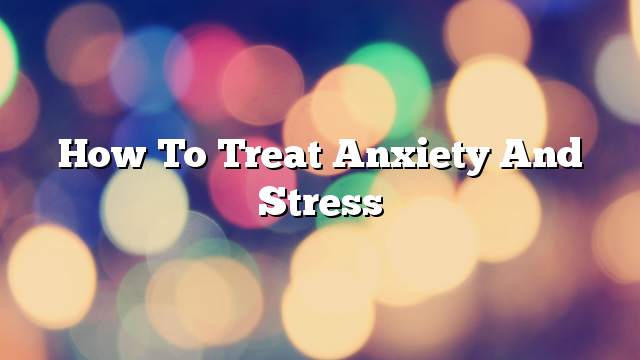Anxiety and tension
Feelings of anxiety and tension are felt by most people from time to time, and stress is usually the result of things people think about and things that are emotionally or physically burdensome, duties, tasks and requirements to do. Anxiety is a feeling of fear and discomfort, and may sometimes be due to stress and tension.
The feeling of tension and anxiety is not always bad. It may be a catalyst to overcome the danger. However, if it goes beyond it, it may lead to stages in which intensive psychological treatment is needed. If anxiety persists for long periods and becomes a human feeling, In treatment before things get worse.
Symptoms of anxiety and tension
The symptoms of anxiety and tension vary from case to case, but they generally include common physical and psychological symptoms:
- Physical symptoms: Headache, nervousness, difficulty concentrating, fatigue, confusion, sweating, tightness of breath, abdominal pain, sore throat and insomnia, and there are some other symptoms that may appear on some of the injured but most of them.
- Cycosomatic Diseases: It is an organic disease that arises due to anxiety and intense emotions, diseases that increase symptoms due to anxiety and tension, and treatment of anxiety is essential for the recovery of these diseases, such as rheumatism, stomach ulcers, high blood pressure, angina.
- Psychological symptoms: No imminent death, nervousness, unexplained anger, difficulty in concentration, tiredness, sleep problems, confusion in social circles.
Causes of anxiety and tension
Anxiety and stress disorder is one of the most common cases among people. The main cause is not as obvious as most mental disorders occur to humans. Researchers believe that natural chemicals in the brain called neurotransmitters have a major role in getting anxiety and stress disorders. The anxiety and stress disorder is caused by biological processes in the body, genetic factors, environmental factors surrounding the person, and lifestyle. There are some studies that indicate that the incidence of anxiety and tension is higher in women compared to P men who are suffering from the same disorder ratio; and there are some factors that may be the cause of anxiety disorder and stress injury, namely:
- The harsh childhood that a person has experienced, and the difficulties he has encountered in his childhood, those who are subjected to traumatic events are most vulnerable to anxiety disorders and tension.
- The disease causes anxiety and tension, especially for those who have serious and chronic illnesses. Those who suffer from anxiety, tension and fear of the future and what it carries, and treatments and economic situation may be a heavy psychological burden on patients.
- Stressors are things that are stressful and troublesome in life, such as exposure to injury, stop work, and low income, which generates anxiety and stress disorders.
- Personality also has a role in anxiety and stress disorders, and the ability of people to tolerate stress varies from person to person. People are more prone to anxiety and stress disorders than others.
- Genetic factors are influential in creating stress and anxiety disorders, and some studies suggest a genetic source of anxiety disorders and stress, and genetically transmitted to future generations.
Complications of anxiety and tension
Treating anxiety and stress disorders if not quick and effective will cause complications more than just anxiety. Serious illnesses may occur or a person may behave in a life-threatening manner, such as resorting to substance abuse, feeling depressed or suffering from digestive disorders. Intestinal, headache and other.
Diagnosis of anxiety and tension
There are some criteria by which a person is diagnosed with anxiety and stress disorders:
- Feeling a person with an acute state of fear and anxiety without obvious reasons, and anxiety, tension and fear accompany him over the course of many months.
- A person’s inability to cope with anxiety or tension, or resistance, is a complete concern.
- The feeling of anxiety is accompanied by a number of symptoms such as nervousness, intense emotion, difficulty concentrating, muscle tension and severity and sleep disorders.
- A person’s life does not go in a natural way as a result of anxiety and tension, which makes the person live in a severe stress that makes his life turn upside down.
- Feeling anxious without being associated with a particular event, or without reason.
Treatment of anxiety and tension
Treatment is done by medication or by psychotherapy, either by using each method individually or by using it together, depending on the individual’s situation and personality.
- Chemotherapy: By taking anti-anxiety drugs and sedatives that relieve anxiety, but these drugs may cause addiction if eaten for a long time; there are also antidepressants, and these drugs are the role of the effect in the work of neurotransmitters, which have an important role in The emergence of anxiety disorders and stress, and should not be taken drugs only after a specialist doctor and follow-up.
- Psychotherapy: And by mental health professionals, by identifying psychological sessions using cognitive behavioral therapy and other psychological treatment methods.
- Behavioral therapy: This treatment is based on the fact that the person acquires his behavior and learns it in a conditional manner based on punishment or reward. Therefore, behavioral therapy aims at re-teaching the patient the proper responses to the situations he is exposed to.
- The method of removing allergies in a systematic manner: makes the patient face the patient and concerns gradually, first by imagining the disturbing situations and that the patient faces in his imagination, and then exposed to the concerns and tension directly to overcome the anxiety completely, and this method is effective, but takes time and must be exercised and supervised by Competent.
